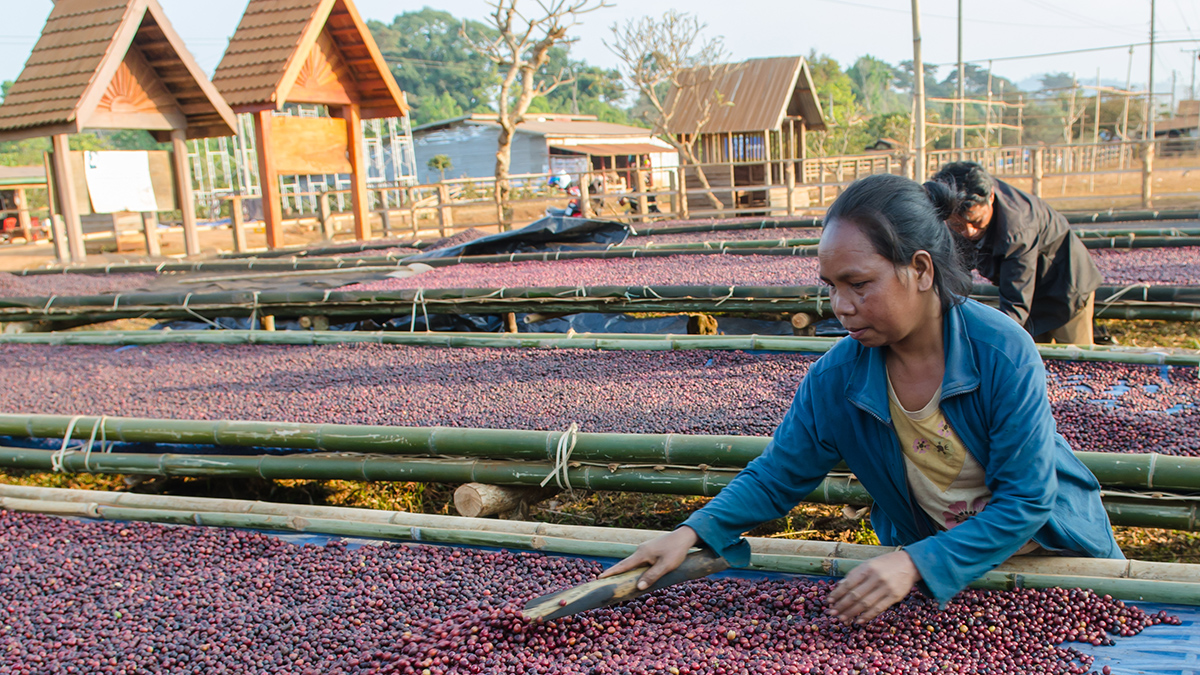Many developing countries need to strengthen their capacity to seize inclusive and sustainable growth opportunities in sustainable agricultural value chains for export. This is especially the case in smallholder-dominated arabica coffee value chain.
This project will focus on the Arabica coffee value chain, including its sustainability and export potential. This value chain is a vital source of income and employment in rural areas of all three countries. Additionally, its production coexists with and benefits local biodiversity, including bird and tree species.
The three beneficiary countries Lao PDR, Thailand, and Viet Nam were selected based on their expressed interest.
These economies have the following characteristics:
- Half or more of the population lives in rural areas, as boosting sustainable incomes of the rural population is important for sustainable development.
- The importance of agriculture for employment, with countries containing at least around one-third of employed people working in agriculture considered.
- The issues of full traceability and sustainable value chains for export, countries at risk of deforestation, with at least 1/3 of their total area being forest.
- Sizeable production of tree-based agricultural value chains (e.g., coffee), as existing deforestation-free regulations are aimed mostly at tree-based commodities produced in the Asian region (notably coffee, palm oil, cocoa, and rubber).
Objective of the Project
The project will improve the ability of public and private stakeholders in selected Asian developing countries to build national productive and export capacity in coffee while contributing to their achievement of Nationally Determined Contributions targets and the SDGs.
Activities
UNCTAD will improve the ability of public and private stakeholders in Lao PDR, Thailand and Viet Nam to build national productive and export capacity in sustainable coffee while contributing to their achievement of Nationally Determined Contributions (NDCs) targets and the SDGs, with a gender perspective. To achieve this objective, the project will generate different activities:
First, it will produce primary data. This will be used to develop country-specific studies that map the capacity and challenges faced by smallholder farmers in the arabica coffee sector, including women, to implement traceability schemes and to adapt to new trade regulations.
Second, UNCTAD will conduct across beneficiary countries a trade-related environmental sustainability analysis of the Arabica coffee value chain in support of exports. This initiative will identify strategic trade opportunities that arise from creating or enhancing the sustainability of the Arabica coffee value chain.
Third, it will undertake a Gender Assessment (GA) seeking to better understand gender-specific implications, identify challenges and opportunities for women’s economic empowerment in the arabica coffee value chain, and inform policymaking as part of wider national priorities for sustainable economic and social development.
Building on these three lines of research, the project will work closely with stakeholders to produce national action plans for the Arabica coffee value chain. They would include main strategic interventions (economic, environmental and gender) as well as a detailed list of actions, responsible stakeholders, budgets and cooperation agreements as developed by stakeholders.
Following discussions of these action plans in national workshops, UNCTAD will work with the authorities to integrate the validated action plans into national policies and support the delivery of selected demand-driven priority actions through advisory, in-person or online capacity-building activities.
Intended Outcomes
- Improved capacity of public and private stakeholders to define gender-sensitive policy options to support the development of sustainable arabica coffee value chains and the adaptation to deforestation free regulations.
- Strengthened capacity of public and private stakeholders in implementing priority actions to support inclusive and sustainable trade from the targeted arabica coffee value chains in beneficiary countries and to adapt to deforestation-free trade regulations.
Link to the SDGs:
SDG:8: Promote sustained, inclusive and sustainable economic growth, full and productive employment and decent work for all.
SDG targets:
1.2 (Reduce poverty by at least 50%),
2.4 (Sustainable food production and resilient agricultural practices),
5.7 (Equal rights to economic resources, property ownership and financial services),
8.3 (Promote policies to support job creation and growing enterprises)
12.2 (Sustainable management and use of natural resources)
Monitoring and Evaluation
Annual progress reports and project final report will be produced for the Development Account, and all relevant evidence of output production and the achievement of outcomes will be kept. In accordance with the DA evaluation framework and project evaluation guidelines, a terminal evaluation to be conducted by an external evaluator will be required for half of the 17th tranche projects. In case this project is selected for evaluation, a detailed evaluation plan will be developed. The qualitative and quantitative data, including those in relation to the indicators of achievements, collected by the UNCTAD project staff through the project implementation will be used for evaluation purposes.

